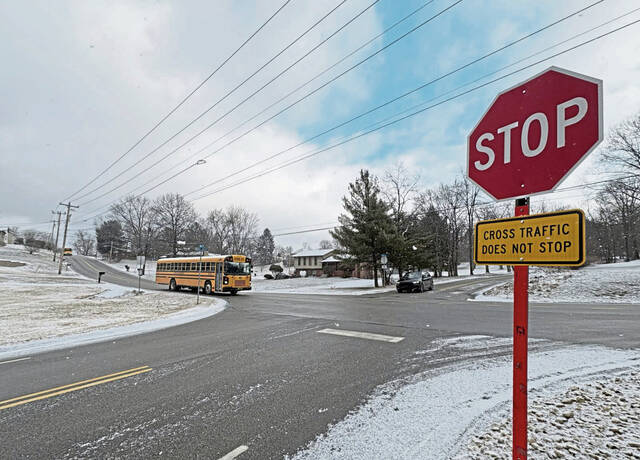Suicide rates are multiplying in Westmoreland County, and to provide support, the county has become the second in the state to start a Local Outreach to Suicide Survivors (LOSS) Team.
The county had 60 recorded suicides in 2023, just two less than the 62 that were recorded in 2022, according to Coroner Tim Carson. Since the county started keeping track in 2005, 2022 marked the highest recorded number of suicides to date, Carson said.
Roughly 25% of suicides in 2022 were recorded in the last two months of the year, according to Carson, and two occurred on New Year’s Eve.
Carson said he’s seen an increase in suicides among older residents, as 15 of the 62 recorded cases in 2022 were for individuals between the ages of 70 and 91. He believes 2023 will be similar, even though the specific data hasn’t been released yet.
“So many people get depressed,” he said, referencing seasonal affective disorder, also known as seasonal depression. “Especially this time of the year, it’s important to check on people who you know might not have anyone … to make sure they’re OK.”
Though 2023 had two fewer cases than 2022, Carson emphasized that the suicide rate is “still high.” There were two suicides recorded in the first week of this year, he said.
“It’s definitely alarming to me,” he said.
Allegheny County also is experiencing a climbing suicide rate. There were 191 reported in 2023, up from 181 reported the previous year.
In the United States, the suicide rate increased by 1% in 2022 to 14.3 deaths per 100,000 from 14.1 in 2021, marking the highest rate seen since 1941, according to the Centers for Disease Control and Prevention’s National Center for Health Statistics.
LOSS Team
Carson said Westmoreland formed the LOSS Team last summer after being contacted by the Ray of Hope Westmoreland County Suicide Awareness and Prevention Task Force, and the team has been an effective tool to support suicide survivors.
The team is comprised of 18 individuals who are suicide loss survivors. Westmoreland joins Northampton as the only counties in the state to establish the support program.
Three members of the LOSS Team who are closest to the location are called by the coroner, if needed, to meet with the survivors to provide resources and emotional support.
“We’ve gotten a lot of positive feedback from families,” he said.
Early intervention
Hoping to change the stigma attached to mental health wellness, Nicole LaVale — who works with children in the Hempfield Area School District and is a member of the county’s LOSS Team — says she shares the message that asking for and receiving help is not shameful.
As a school-based therapist, LaVale works with about 62 children at any given time during the school year, a pretty large caseload, she said.
“In our society, we have that horrible negative stigma on mental health, and it leads people to die in silence every day,” she said. “That’s something that I take very seriously.”
LaVale works alongside Heidi Latimer and another part-time therapist, and the three of them cover Hempfield’s nine schools through the outpatient child and adolescent behavioral health therapy program based out of Independence Health System Latrobe Hospital.
This arrangement allows them to help children who might not receive treatment otherwise.
“We have lots of families whose children really, really need therapy, and if it were up to them, they would not get their child therapy,” she said.
Though one of the reasons families won’t send their adolescents to therapy is the stigma surrounding it, often the problem lies in the lack of transportation, as parents are working full time.
“Families don’t have to come and get their child … and take them back to school (for therapy),” LaVale said. “It decreases the amount of academic time that they’re missing and social time that they’re missing during the school day.”
The ratio of students to therapists can make the job difficult, Latimer said.
“It’s not like we’re going back to the same school every day, which I think would make it a lot easier,” she said.
Personal experience
Latimer also is a member of the county’s LOSS Team, and she and LaVale went through training in Harrisburg on suicide and suicide prevention. Neither has been called to help at a scene.
LaVale lost her brother to suicide, and Latimer lost her first cousin, whom she said was like a brother, to suicide.
“We learned … people who have lost someone to suicide are four times more likely to die by suicide themselves,” LaVale said. “So it’s really postvention as prevention, and just being there for someone else going through that very difficult time is priceless.”
Latimer said she’s recently heard more suicidal ideations from the children she sees — especially around the holidays, citing an increase in depression as well.
She said one cause could be the lack of socialization amid the coronavirus pandemic. She said children are overhearing stressful conversations parents are having about the cost of living as well.
LaVale said a lot of their clients are struggling with anxiety and depression, and though she sees mostly elementary-aged students, suicidal threats and comments are still prevalent — if not by them, by the people in their family.
Mental health issues can become compounded during the winter months, according to LaVale, because of lack of sunlight, or seasonal affective disorder. But her busiest months are actually March and April, which is when she and Latimer are “completely bombarded” by clients.
“When the sun starts shining more, and it starts to get warm, relatively healthy people — their moods start to brighten, and they start to feel better,” LaVale said. “But people with more serious mental health issues don’t, so their issues get exacerbated because everyone around them is starting to feel better.”
It’s during this period that both have to usually pause referrals because they are unable to take on new children for therapy, sometimes having upward of 75 caseloads.
“I can’t see that many kids as much as they need to be seen,” LaVale said. “There’s just so many … the need is so great.”
She also cited a link between technology use and an increase in suicide and depression rates.
“Kids in this generation do not play outside as much as … I did when I was a kid,” LaVale said. “They are inside and they’re on a screen, and their socialization is very minimal.”
Activities that kids were participating in years ago have increased in cost, which LaVale said could be another contributor.
“(Kids) need to play, and they need to do fun things, but because everything costs so much more today, … families can’t do it anymore,” she said. “And a lot of times, you know, unfortunately, then the kid is left to parent themselves.”
Learning to cope
LaVale said one of the most important jobs as a school-based therapist is educating students about mental health and the severity of making certain comments.
“As young humans, they can learn better coping skills,” she said.
The No. 1 coping mechanism is to talk about feelings, Latimer said.
“I ask them, ‘Who is your person you go to vent with?’ ”
Since she has a background in art, LaVale said she often suggests art as a healthy coping mechanism for clients.
“Just being outside can increase your mood,” she said. “Doing anything that you enjoy and makes you happy and doesn’t hurt you or anybody else can be a healthy coping skill.”
‘Talk to somebody’
LaVale said LOSS Team members will bring families a care package, which lists therapists they could access if needed.
But the stigma surrounding mental health help often deters people from using those resources.
“We, as survivors of loved ones (who died) by suicide, we can say it is beneficial — to talk to somebody rather than just suffering by yourself and pain,” LaVale said. “I think to hear it from someone who has experienced it is very impactful.”
If you are having thoughts of suicide, call 988 to reach the Suicide and Crisis Lifeline or visit SpeakingOfSuicide.com/resources for help.
This story has been updated to reflect that the two LOSS Team organizations in Pennsylvania are in Westmoreland and Northampton counties. All of the members of the LOSS Team are suicide loss survivors.







